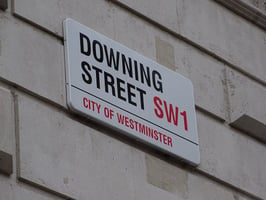Laura Kuenssberg’s cancelled interview with former Prime Minister Boris Johnson continues to gain...
Two and a half years after coming to power, Boris Johnson’s time as Prime Minister is coming to an end.
It has been a period marked by challenges and scandals. And it ended in humiliation as he suffered more resignations than any other Prime Minister in modern history.
As news broke of his departure, we thought this would be the right time look back at some of his memorable media interviews and appearances and the media training lessons you can learn from them.
There have been many to choose from. At one point, Mr Johnson reportedly hid in a fridge – while visiting a dairy – to avoid having to face questions on Good Morning Britain.
Partygate
Where else could we start? Partygate has dominated the political coverage for months.
You may remember the story first broke before Christmas and has rumbled on amid a flurry of new allegations, investigations and fines.
Mr Johnson’s approach to the scandal was to tell us to ‘wait for the Sue Gray investigation’ and that he just wanted to ‘get on with the job’.
At times, his frustration with the focus on the issue saw Mr Johnson lose his cool in media interviews.
A particularly memorable one came in April during a visit to India.
Beth Rigby, from Sky News, asked a series of questions about the Downing Street parties. An increasingly tetchy Mr Johnson looked at his watch (never a good look in a media interview) and told her: “I want to talk about the point of this trip. Ask me questions relating to the trip.”
If that wasn’t bad enough, the interview descended into an argument about the focus on Partygate rather than the Prime Minister’s trade agenda.
When the political editor argued she had not spent as long on the party allegations as the BBC, the Prime Minister replied: “It’s not a competition. Get onto the subject of the trip.”
‘Corrupt country’
What do two statements made almost 50 years apart have in common?
The answer is they both serve as painful reminders of the danger of negative language.
You may remember that during COP26, Mr Johnson denied the UK was a “corrupt country”.
It came during a COP26 press conference, where instead of discussing saving the planet, the Prime Minister struggled to move the focus away from the allegations of sleaze engulfing his government at the time.
“I genuinely believe that the UK is not remotely a corrupt country, nor do I believe that our institutions are corrupt,” he told reporters.
“It is very important to say that.”
"I genuinely believe that the UK is not remotely a corrupt country"
— BBC Politics (@BBCPolitics) November 10, 2021
Boris Johnson says "you've got cases where sadly MPs have broken the rules in the past, maybe guilty of breaking the rules today, what I want to see is them facing appropriate sanctions"https://t.co/3JjRunVstU pic.twitter.com/QZKLS4gFeO
After days of scrutiny about the behaviour of politicians triggered by the fallout from the Owen Paterson debacle, the situation needed addressing.
To have to make such a denial on a global stage is humiliating and reputationally damaging.
But look at it from a media training and message development and testing perspective - it is the language we tell our delegates to avoid in interviews.
Why?
Because it makes journalists’ lives easy. It gives them a brilliant quote of the Prime Minister speculating whether the country he leads is ‘corrupt’.
It is gold dust, and the stories pretty much write themselves.
It is the type of language journalists love, and it was little surprise to see the ‘corrupt’ quote used in countless headlines and as the basis for many opinion pieces.
The result was that rather than quashing the criticism, it reinforced it and spread it to a much wider audience.
And it brought back memories of something said half a century ago.
During the Watergate scandal in 1973, President Richard Nixon, said: “I am not a crook”.
He said: “The people have got to know whether or not their President is a crook. Well, I’m not a crook. I’ve earned everything I’ve got.”
That infamous soundbite became etched into history. And President Nixon resigned nine months later – a pretty identical timescale to Mr Johnson’s departure.
The Peppa Pig speech
When the Prime Minister gave a speech to the Confederation of British Industry, his performance was described as “shambolic”, “embarrassing” and “a mess”.
And that was the reaction from the people in his party.
When Sky News cut away from the speech, presenter Ian King described it as “excruciating”.
It was hoped the speech would see Mr Johnson announce detailed policy in pursuit of the levelling-up agenda.
Instead, he recounted a visit to Peppa Pig World, criticised the civil service for not creating the cartoon character, imitated a car and compared himself to Moses.
And then there was the uncomfortable part where he completely lost his place, leaving him to mutter “blast” and “forgive me” repeatedly as he attempted to get his speech notes back into some semblance of order.
"Forgive me... forgive me... forgive me"
— Sky News (@SkyNews) November 22, 2021
Prime Minister Boris Johnson appears to lose his place whilst delivering a speech to the CBI
Read today's top story: https://t.co/4ozTbgvoxl pic.twitter.com/0bRlJd87FF
Mr Johnson is, of course, known for his blustering style. But this was different.
Such was the chaotic and rambling nature of his performance that one journalist asked him afterwards if he was ok.
Elsie and the battle to keep warm
It is not often a journalist reveals how they think a spokesperson should have dealt with a tricky question - not outside of our media training courses, anyway.
But that did happen when Mr Johnson was interviewed on Good Morning Britain by Susannah Reid - his first interview on the programme for five years.
Much of the focus of the interview was on one question.
It was about Elsie, and it highlighted the cost-of-living crisis many face.
Elsie, a 77-year-old widow, has seen her energy bills rocket from £17 to £85 a month – an additional £816 a year to find.
To cut back costs, she ate one meal a day – yellow sticker discounted items - and got up early to use her freedom bus pass for much of the day to stay warm and avoid using energy in her home.
The Prime Minister was asked what else she should cut back on.
Here’s what he said.
“I don't want Elsie to cut back on anything,” he said.
“Let's talk about Elsie and what we are doing and - just to remind you that the 24-hour freedom bus pass was something that I actually introduced.”
Ms Reid replied: “Marvellous, so Elsie should be grateful to you for her bus pass? What else should she cut back on?”
“There are plenty of things more that we are doing,” Mr Johnson continued.
“What we want to do is make sure we have people who are in particular hardship looked after by their councils, we are putting much more money into local councils.
“We have the particular payments to help elderly people in particular with the cost of heating.”
The exchange became increasingly uncomfortable for the Prime Minister, with Ms Reid revealing Elsie already qualified for the help he outlined and that she will not receive the Council Tax rebate.
It finished with Ms Reid saying: “Prime Minister, you can’t say anything to help Elise, can you?”
He replied: “No, because what we are doing is making sure we take the steps now to invest in our energy supply, to ensure we have the supply for the medium and the long-term.”
.@susannareid100 tells the PM about 77-year-old Elsie who eats one meal a day and stays on the bus all day to avoid using energy at home.
— Good Morning Britain (@GMB) May 3, 2022
She questions the PM about the comments he made about people having to make choices about what they spend their money on. pic.twitter.com/26b7kPuBNh
That last response serves as a reminder of the importance of listening to the language used in the question. Did he mean to say there wasn’t anything he could say to help Elsie?
How should the Prime Minister have handled this question? What should other spokespeople do when confronted with an uncomfortable case study like this?
Well, Ms Reid provided the media training answer.
Speaking to LBC later the same day, she said: “I would say for any Prime Minister, or any party leader who deals with a difficult case like that, the answer is not to just revert to ‘we are going to invest for the long term’, ‘we’re making sure people have got jobs’, ‘we’ve got this fund over there that can help’.
“The answer is to say, ‘that sounds dreadful for Elsie, I’d like to find out more about it’. ‘And if she would let me, I would get in touch with Elsie, find out exactly what that means and see how we can help her’.
“That’s the answer.”
'There are people worse off than she is, and there's no answer for them.'
— LBC (@LBC) May 3, 2022
GMB Presenter Susanna Reid tells Andrew Marr she has spoken to Elsie since grilling Boris Johnson, and the 77-year-old was 'disappointed' by the PM's answer to her plight.@AndrewMarr9 | @susannareid100 pic.twitter.com/4XIp0GxPDU
Who’s Lorraine?
You may have thought the interview with Good Morning Britain could not have gone any worse. You would be wrong.
It memorably ended with Ms Reid referring to the show about to start afterwards, hosted by Lorraine Kelly,
“Who’s Lorraine?”, the Prime Minister asked.
“Who’s Lorraine? Lorraine is a legend,” Ms Reid replied.
Boris Johnson doesn't know who Lorraine Kelly is pic.twitter.com/yMtKifRqPb
— PoliticsJOE (@PoliticsJOE_UK) May 3, 2022
The gaffe was highlighted as an example of Mr Johnson being out of touch with millions of ordinary Britons.
And Downing Street scrambled to insist that he did know who the popular presenter was, adding he “was not fully across the ITV daytime line-up this morning.”
There are, of course, many other examples we could have used in this media training skills blog. And as the battle to replace him heats up, there should be plenty of other case studies for us to explore.
Media First are media and communications training specialists with over 35 years of experience. We have a team of trainers, each with decades of experience working as journalists, presenters, communications coaches and media trainers.
Subscribe here to be among the first to receive our blog.




